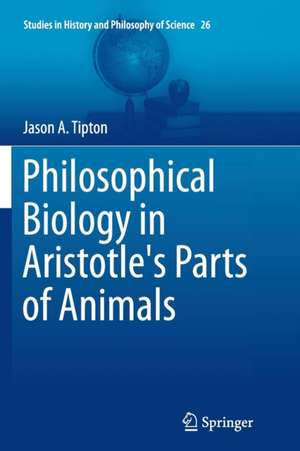Philosophical Biology in Aristotle's Parts of Animals: Studies in History and Philosophy of Science, cartea 26
Autor Jason A. Tiptonen Limba Engleză Paperback – 27 aug 2016
Din seria Studies in History and Philosophy of Science
-
 Preț: 592.15 lei
Preț: 592.15 lei - 15%
 Preț: 639.24 lei
Preț: 639.24 lei - 15%
 Preț: 688.94 lei
Preț: 688.94 lei -
 Preț: 284.47 lei
Preț: 284.47 lei - 15%
 Preț: 690.41 lei
Preț: 690.41 lei -
 Preț: 383.36 lei
Preț: 383.36 lei - 18%
 Preț: 1202.28 lei
Preț: 1202.28 lei - 15%
 Preț: 636.20 lei
Preț: 636.20 lei - 15%
 Preț: 634.60 lei
Preț: 634.60 lei - 18%
 Preț: 940.20 lei
Preț: 940.20 lei - 18%
 Preț: 937.87 lei
Preț: 937.87 lei - 15%
 Preț: 635.23 lei
Preț: 635.23 lei - 15%
 Preț: 631.05 lei
Preț: 631.05 lei - 15%
 Preț: 633.64 lei
Preț: 633.64 lei - 18%
 Preț: 935.24 lei
Preț: 935.24 lei - 15%
 Preț: 636.50 lei
Preț: 636.50 lei - 18%
 Preț: 937.13 lei
Preț: 937.13 lei - 18%
 Preț: 930.90 lei
Preț: 930.90 lei - 18%
 Preț: 1361.18 lei
Preț: 1361.18 lei - 18%
 Preț: 1213.31 lei
Preț: 1213.31 lei - 15%
 Preț: 627.04 lei
Preț: 627.04 lei - 15%
 Preț: 622.86 lei
Preț: 622.86 lei - 18%
 Preț: 1199.17 lei
Preț: 1199.17 lei - 18%
 Preț: 951.24 lei
Preț: 951.24 lei - 15%
 Preț: 630.60 lei
Preț: 630.60 lei - 15%
 Preț: 631.86 lei
Preț: 631.86 lei - 15%
 Preț: 631.05 lei
Preț: 631.05 lei - 15%
 Preț: 637.97 lei
Preț: 637.97 lei
Preț: 554.10 lei
Preț vechi: 692.62 lei
-20% Nou
Puncte Express: 831
Preț estimativ în valută:
106.04€ • 110.75$ • 87.92£
106.04€ • 110.75$ • 87.92£
Carte tipărită la comandă
Livrare economică 07-13 februarie 25
Preluare comenzi: 021 569.72.76
Specificații
ISBN-13: 9783319376523
ISBN-10: 3319376527
Pagini: 218
Ilustrații: XI, 207 p. 66 illus., 40 illus. in color.
Dimensiuni: 155 x 235 x 12 mm
Greutate: 0.31 kg
Ediția:Softcover reprint of the original 1st ed. 2014
Editura: Springer International Publishing
Colecția Springer
Seria Studies in History and Philosophy of Science
Locul publicării:Cham, Switzerland
ISBN-10: 3319376527
Pagini: 218
Ilustrații: XI, 207 p. 66 illus., 40 illus. in color.
Dimensiuni: 155 x 235 x 12 mm
Greutate: 0.31 kg
Ediția:Softcover reprint of the original 1st ed. 2014
Editura: Springer International Publishing
Colecția Springer
Seria Studies in History and Philosophy of Science
Locul publicării:Cham, Switzerland
Cuprins
Dedication.- Acknowledgments.- Table of Contents.- Chapter 1: Aristotle’s Philosophy and Biology: The biological phenomena.- Chapter 2: The Problem of Beginnings.- Chapter 3: Recognizing Sameness and Otherness in Animals.- Chapter 4: The Examination of the Animate in Light of the Inanimate: or,The Argument for the Autonomy of the Zoological Inquiry.- Chapter 5: Finding Fault with Nature.- Chapter 6: The Division and Combination of Labor.- Bibiography - Editions, Translations and Commentaries.- Index.
Textul de pe ultima copertă
This book provides a detailed analysis of Aristotle's Parts of Animals. It takes its bearings from the detailed natural history observations that inform, and in many ways penetrate, the philosophical argument. This analysis raises the question of how easy it is to clearly disentangle what some might describe as the "merely" biological from the philosophical. This book explores the notion and consequences of describing the activity in which Aristotle is engaged as philosophical biology. Do readers of Aristotle have in mind organisms like sea squirts (ascidians) or sea cucumbers (holuthurians) when trying to understand Aristotle's argument regarding plant-like animals? Do we need the phenomena in front of us to understand the terms of the philosophical argument in a richer way? The discussion of plant-like animals is important to Aristotle because of the apparent continuum between plant and animal life. Where does Aristotle draw the line? Plant-like animals bring this question into focus and demonstrate the indeterminacy of any potential solution to the division. This analysis of the Parts of Animals shows that the study of the nature of the organic world was Aristotle's way into such ontological problems as the relationship between matter and form, the interplay between form and function, and the heterogeneity of the many different kinds of being.
Caracteristici
Illustrates the biological details that provide the foundation for the philosophical argument Retraces Aristotle’s steps in Lesvos, Greece Provides a commentary on the whole of the Parts of Animals
